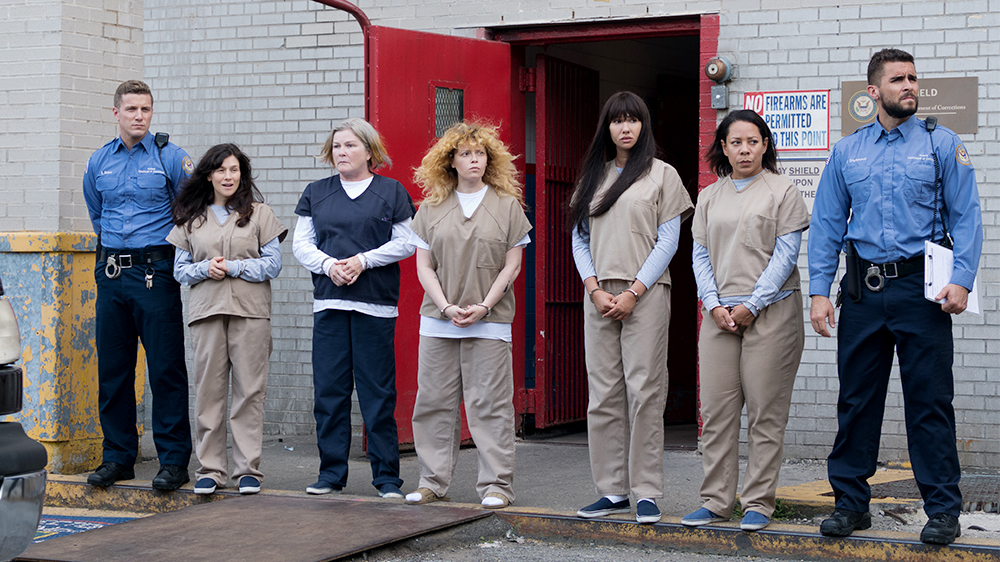‘Orange Is the New Black’ is the story of Piper Chapman (Taylor Schilling), a woman who has been convicted of smuggling drug money for her ex-girlfriend Alex Vause (Laura Prepon), that she had committed a decade before her incarceration. Sent to Litchfield Penitentiary, a minimum security women’s prison in New York, Piper is terrified at the idea of what prison life is going to be like. But once inside the prison, Piper finds out that things aren’t at all like what she assumed them to be.
Created by Jenji Kohan, the comedy-drama series depicts the realities of life in prison. It also explores the circumstances of other prisoners besides Piper Chapman and weaves a beautiful narrative around these flawed characters. The authenticity with which both the story and prison life have been approached would definitely make the audience wonder whether or not the series has any basis in reality. If you’re one of these people, then we have the answers for you!
Orange Is the New Black: Inspired by Piper Kerman’s Memoir
Yes, ‘Orange Is the New Black’ is a true story. The series is based on ‘Orange Is the New Black: My Year in a Women’s Prison,’ a memoir by Piper Kerman. The book and the show that has been adapted from it follow the same storyline, albeit with a few minor changes here and there. The most noticeable of these changes is, of course, the name of the protagonist herself. Similarly, the name of the other characters in the show has been altered as well, as they are all based on real-life people whom the author met during her stint in prison. Piper Kerman was sentenced to 15 years in prison on money laundering charges, out of which she ended up serving only 13. These 13 months are covered in ‘Orange Is the New Black.’

While the series is a brilliantly written comedy, the actual themes that it explores are far more nuanced. ‘Orange Is the New Black’ takes a look at camaraderie and kinship that form almost instantly between people who are in a dire situation, which is, in this case, a prison. The series also challenged the preconceived notions about prison life and the prejudices against the inmates there and the crimes they might have committed.
In an interview on the radio show ‘Here & Now,’ author Piper Kerman recalled her own time in prison. She said “As I went through the processing — you know process as they literally strip you down, take everything you’ve got, right down to your underpants, and dress you in the garb of the prisoner — I of course got more and more scared. Then I was put into general population with all of these hundreds of other women with whom I would be living for the next year. And I was frightened. And so the last thing that I expected was for them to say things like ‘Do you need some toothpaste?’ ‘Do you need a cup of coffee?’ ‘Are you okay?'”
Taylor Schilling, who portrays Piper Chapman, the driving force for this niche storyline, revealed that to better prepare herself for the role, she spent some time with Piper Kerman. “I really have had a great time with Piper Kerman, the real-the real Piper…just the way she lives her life; I think she’s such an extraordinary woman. She’s really taken her own experience and translated it into a way to help so many women, and to use her own personal journey to impact the journey of lots of people around her,” the actress told ScreenSlam.

While the series follows the real-life account of Piper Kerman, it was always intended by the show’s creator, Jenji Kohan, to tell the stories of women of color and those in the LGBTQ+ community that are incarcerated. In this way, Piper Chapman became an instrument through which these narratives could be safely explored and also point out how skewed the perspective of a privileged white person might be regarding these women in prison.
“In a lot of ways Piper was my Trojan Horse. You’re not going to go into a network and sell a show on really fascinating tales of black women, and Latina women, and old women and criminals. But if you take this white girl, this sort of fish out of water, and you follow her in, you can then expand your world and tell all of those other stories,” Kohan said in an interview with NPR. Though the gradual shift from Piper’s point of view to the broader perspective of the other women in ‘Orange Is the New Black’ was met with enthusiasm by the audience, it wasn’t entirely easy for Taylor Schilling.
In a conversation with the Independent, the actress said, “I think Piper held the projection of a lot of white privilege for the collective that was invested in the show. That’s a vital theme to discuss, but it’s also not the easiest thing to hold… It was so wonderful to be a part of, of course, then it was an interesting experience to observe the change from when we started. It really changed. I definitely observed that feeling of celebration shifting into resentment of Piper. It’s a difficult thing to not personalize that.”

The boom in representation on television and in movies since 2013, when the series first came out on Netflix, has been nothing short of extraordinary. By bringing the true account of Piper Kerman’s life in prison, ‘Orange Is the New Black’ has certainly paved the way for many more such stories centered around people of color and the LGBTQ+ community.
Read More: Shows Like Orange Is the New Black


You must be logged in to post a comment.